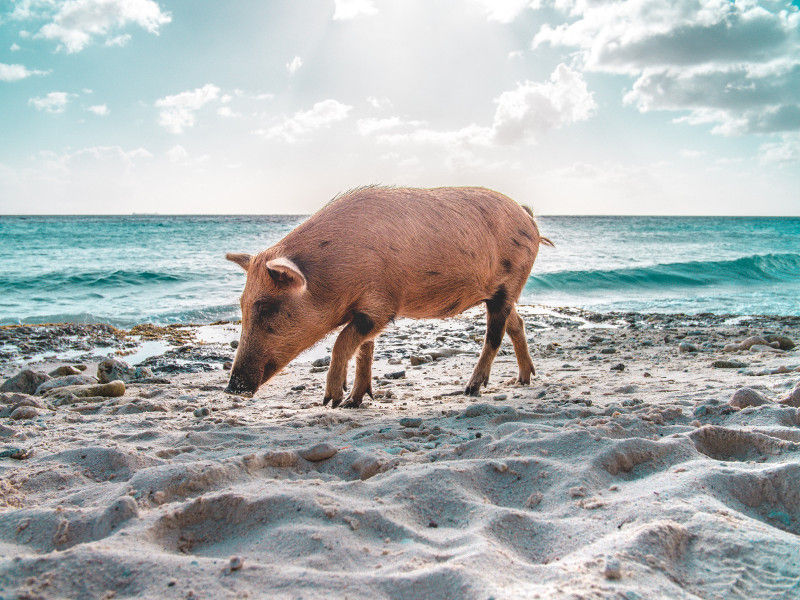There’s no denying the cuteness of ‘mini pigs’, a popular term that describes small-statured pigs that are kept, typically, as house pets. Also known as micro pigs, pocket pigs, and even teacup pigs, these adorable little piggies have been rapidly increasing in popularity over the last decade.
Pigs are incredibly affectionate and intelligent animals, akin to dogs, making them a wonderful companion for animal lovers. Unfortunately, thousands of pigs are abandoned or surrendered to animal sanctuaries every year because their owners did not do enough research before choosing to adopt one.
If you’re considering a mini pig as a pet, there are several things to consider first.
Size
Mini pigs are still pigs, and pigs are fairly large mammals. Descriptive terms used to market pigs, like teacup and micro, can be very misleading. A fully grown mini pig can weigh between 70 to 150lbs (with many weighing upwards of 200lbs!), which is much larger than the cute baby pigs many have in mind when shopping for this type of pet.
Legality
Mini pigs are classified as farm animals, and in many municipalities farm animals are not permitted as pets. Many pet owners are left having to choose between re-homing their pet or moving because they don’t research municipal bylaws in their region first.
Unique Care
Mini pigs have particular housing, care, and nutritional needs. They require quite a lot of space and thrive best in large homes with a roomy, fenced-in backyard.
Pigs are highly intelligent. In fact, pigs are considered the fifth most intelligent animal in the world – even more than dogs. As a result, pigs need plenty of enrichment and stimulation, including ample time to root with their snouts and manipulate objects such as toys.
Without enough stimulation, pigs are likely to develop destructive behaviours, aggression, excess vocalizing, and more. An under-stimulated, frustrated mini pig can wreak havoc in your home, destroying everything in sight, especially furniture.
Ideally, a pig should be kept outdoors with a warm shelter and large play area, regardless of the size of the pig. Industrial grade fencing is a must, as pigs can easily destroy a less-than-adequate fence. They require adequate heating in the winter and cooling aids in the summer, too.
Sometimes pigs can be aggressive and territorial, and don’t always do well in multi-pet households, either. Like dogs, proper socialization at an early age is essential for developing a healthy social framework.
Ensuring your mini pig has adequate nutrition can be a challenge. Thankfully, there are excellent options for complete and balanced commercial mini pig foods. Pigs do eat a fair amount of food, as an average mini pig may eat anywhere from 2 to 7 cups of food a day, depending on their size. Much like having a giant breed dog, the amount of food required can become cost prohibitive over time.
In many areas, veterinary care for pigs is not a readily available service. In this case, you may have to travel a fair distance to see a veterinarian who specializes in pigs; transporting a pig in a vehicle can be quite the challenge as many pigs experience stress and anxiety in this setting. Mini pigs require spay or neuter, vaccinations, tusk trims, parasite treatments, and more.
While pigs can be house trained, their manure can smell quite intense. And there will be lots of manure to pick up, too. Many pigs will poop at least three times per day.
The idea of owning a mini pig may seem wonderful, however it is important to do thorough research about the reality of owning one. Pigs can live 15-18 years, so owning a pig is certainly a long-term commitment.
Pig life is not a glamorous life as often depicted on social media platforms like Instagram and Tik Tok, for example. Social media doesn’t help educate prospective pig owners, as they often portray an unrealistic depiction of pig life. When we see a picture posted of a cute mini pig in an adorable outfit, we do not see the time it took to set up the shot, the dozens of pictures taken to find the right one, the mess behind the camera, and more.
In the right environment, and under the care of an educated owner, pigs can be wonderful and rewarding companion animals. They are clean, affectionate, and bursting with personality. As with any pet, it is important we pay attention to their unique individual needs so they can live their best life.
Brandon Forder, known as The Pet Expert, is vice-president of Canadian Pet Connection, an industry leader in healthy pet lifestyles. Brandon is certified in pet nutrition, and has more than twenty-five years’ experience specializing in pet health and behaviour. He has written hundreds of informative pet-related articles for newspapers, magazines, radio, and the popular Ask the Pet Expert Blog. Brandon is highly skilled in pet problem solving, and enjoys teaching others about smart and responsible pet ownership. To learn more, visit www.CanadianPetConnection.ca.












